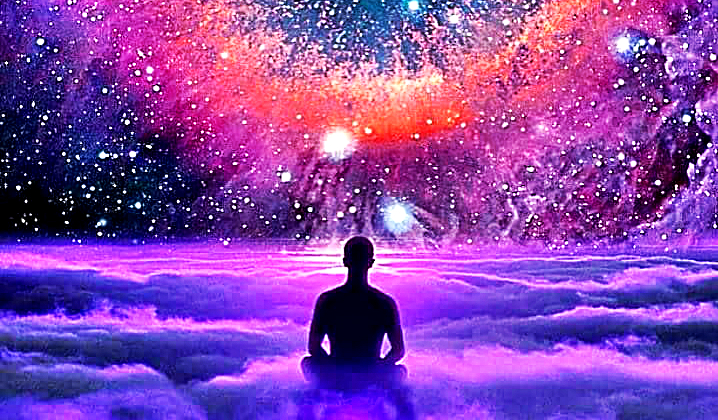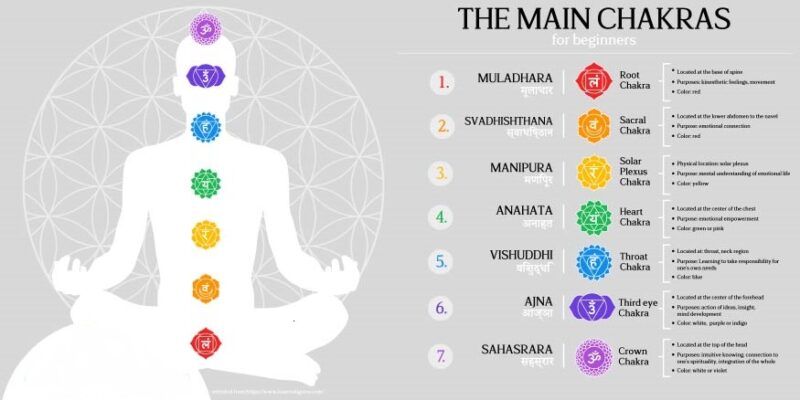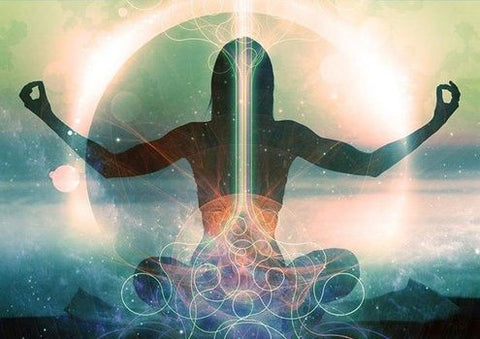When the being is at ajna chakra, point between eye brows, source of creation appears as a star that is…
Conduct of a Realized Being

Disciple Rama and his Guru Sage Vasishta – Yoga Vasistha
Rama asked, “Tell me sage. After a holy man is acquainted with the supreme essence that is without beginning or end, what perfection does he seek?”
2 Vasishta replied:— Hear the high state arrived at by a holy man after he has known the knowable, and how such a man conducts his life throughout the whole course of his existence.
3 He lives apart from human society in his solitary retreat in the woods. The stones of the valleys, the trees of the forest, and young antelopes are his friends, family and associates.
4 He considers the most populous city to be a lonely desert. His disasters are his blessings and all his dangers are celebrations to him.
5 His pains are his pleasure and his meditations are like musings to him. He is silent in all his dealings and quiet in all his conduct through life.
6 He is as asleep in his waking hours and remains as if dead to himself while he is living. He manages all his affairs with a coolness, as if he were engaged in nothing.
7 He is pleasant without tasting any pleasure. He is friendly to his fellow beings without any selfish interest of his own. He is strict with himself but always kind to others. He is has no desire for anything, but has a full desire for the common welfare.
8 He is pleased with others’ conduct without having any course of action for himself. He is devoid of sorrow, fear and care, yet he is always seen wearing a sad appearance.
9 He afflicts nobody, nor is he afflicted by anybody. Though full with his private afflictions and privations, he is ever pleasant in company.
10 He is neither delighted with his gain nor depressed at his loss nor desirous to get anything. Though there may be causes for him to feel joy and sorrow, yet they are never visible on his face.
11 He sympathizes with the unhappy and congratulates happy people. But his collected mind is always invincible in every circumstance of life.
12 His mind is not inclined to acts other than those of righteousness, as is the habit of noble-minded men by their nature, and not any effort on their part.
13 He is not fond of pleasantry nor is he addicted to dullness. He does not run after wealth, but lacks desire and is finished with all cravings.
14 He abides by the law and acts accordingly, whether he is pinched by poverty or rolling in riches. He is never dejected or elated at the unforeseen good or bad events of life.
15 Wise men are seen joyful or sorrowful at times, without changing the quietness and serenity of their nature at anytime. They act the part of players on the stage of the earth.
16 Those who know the truth bear no affection for greedy relatives and false friends, as if they were looking at bubbles of water.
17 Without the affection of the soul, they bear full affection in their hearts for others. The wise man remains quite possessed of himself, while showing his paternal affection to all.
18 The ignorant are like winds passing over running streams. They slightly touch the poisonous pleasures of their bodies, like winds touching the rising waves, and at last are drowned in the depths of their sensuality.
19 But the wise man outwardly deals alike with all with perfect coolness and stillness of his soul within. He seems outwardly to be engaged in business, but his inner mind is wholly disengaged from all worldly concerns whatsoever.
20 Rama asked, “But how can a true sage of such nature be distinguished from the many pretended ones, and the ignorant also, who falsely assume such a character only to beguile others? Many hypocrites wander about like horses, wearing the false costume of devotees, pretending true devotion to religion.”
22 Vasishta replied:—
Rama, I say that such a nature, whether it is real or pretended, is the best and highest perfection of man. I know that the learned in vedic knowledge always view this state as the model of perfection.
23 Those who are dispassionate and unconcerned with acts still manage to conduct their secular affairs and actions, like those who are moved by their passions. Though they are adverse to criticism, yet they cannot help but criticize the ignorant because of their compassion towards them.
24 Visible phenomena are all imprinted in the mirror of their minds, like the reflected shadows of buildings. They look upon phenomena with full knowledge of their shadowiness, just as they perceive the fallacy of laying hold of a lump of gold in a dream.
25 There is a coolness pervading their minds, altogether unknown to others, just as the sweet fragrance of sandalwood is unperceived by brutes at a distance.
26 Only those who know the knowable and are equally pure in their minds can distinguish hypocrites from other people, just as only a snake can trace the course of another snake.
27 They are the best of men who hide their good qualities from others. For what man is there who will expose his most precious treasure in the market with the raw produce of his land?
28 The reason to conceal rare virtues is to keep them unnoticed by the public. The wise who lack desire for reward or reputation have nothing to gain or expect from the public.
29 Rama, know that solitude, poverty, disrespect and disregard of men are more pleasing to the peaceful sage than mankind’s most valuable gifts and honors.
30 The indescribable delight which attends on the wise man from his conscious knowledge of the knowable is inexpressible in words and is invisible to others, as is its knower also.
31 The egoist wishes men to know his qualification and honor him for it, and not those who are beyond egoistic feelings.
32 It is possible even for the ignorant to reap the results of their practices, such as rising and moving about in the air by means of mantras, and the power of certain drugs that are adapted to those ends.
33 He who can makes effort for any particular end succeeds in accomplishing that end whether he is a clever or ignorant man.
34 Tendencies towards good or evil are implanted in the bosom of man as results of the acts of their past lives. These come to display themselves in action at their proper time, just as sandalwood emits its latent fragrance in its season all around.
35 He who is pre-possessed with the knowledge of his individual ego, coupled with his desire for enjoyment of phenomena, takes up the practice of khechari yoga [the practice of placing the tongue above the soft palate and into the nasal cavity] whereby he ascends in the air and gains the reward of his action.
36 The wise man who has nothing to desire knows such practices to be as false as empty air. He refrains from displaying his actions, which he knows at best is only casting to the winds.
37 He derives no good from observing practical yoga, nor does he lose any of his holiness by not observing them. He has nothing to gain from anybody and loses nothing at the loss of anything.
38 There is nothing in earth or heaven, or among the gods or anywhere else, which may be desirable to the magnanimous or to one who has known the Supreme Soul.
39 What is this world to him who knows it to be only a heap of dust and who considers it no better than straw? Then what can be in the world which could possibly be desirable to him?
40 The silent sage, whose soul is full of knowledge and whose mind is quite at rest without fondness for human society, remains content in the state as he is, quite satisfied with whatever occurs to him.
41 He is always cool within himself and reserved in his speech. Eternal truths form the ground work of his mind which is as full and deep as the ocean, and whose thoughts are as bright as daylight.
42 He is full of cool composure in himself, like a pleasant lake resting with its clear waters. He also gladdens all others about him, like the fair face of the full moon cheers the spirits of all.
43 The mandara groves of Nandana paradise, with their woodlands scattered with the dust of their blossoms, do not delight the soul as much as the wise sayings of pundits cheer the spirit.
44 The moon diffuses its cooling beams and the spring season scatters its fragrance around. The concise sayings of the wise and great scatter their sound wisdom all about, serving to elevate and enrich all mankind.
45 The substance of their sayings proves the appearance of the world to be as false as a magic show. They inculcate the prudence of wearing out worldly cares day by day.
46 The wise saint is as indifferent to the suffering of heat and cold in his own body as if they were disturbances in the bodies of other men.
47 In his virtues of compassion and charity, he resembles the fruitful tree which yields its fruits, flowers, and all to the common use, and exists itself only upon the water it sucks from the ground or receives from heaven.
48 This tree gives to all whatever it possesses of its own body. By virtue of its unsparing munificence to all creatures, this tree lifts its lofty head above them all.
49 One seated in the palace of knowledge has nothing of sorrow for himself, but he pities the sorrows of others, just as a man seated on a rock takes pity on miserable men groveling in the earth below.
50 A wise man is tossed about like a flower by the rolling waves in the eventful ocean of this world. He is set at rest as soon as he gets over it and reaches the shore on the other side.
51 He laughs with the calmness of his soul at the same unvaried course of the world and its people. He smiles to think on the persistence of men in their habitual error and folly.
52 I am amazed to see these deviant men wandering in the mazes of error, fascinated by the false appearances of the phenomenal world as if they were spell-bound to visible phenomena.
53 I have learnt to spurn the eight kinds of prosperity as mere straw. They are of no real good, but rather are causes of evil to men. Though I am inclined to laugh at them, yet I refrain from my habitual disposition of tolerance and patience.
54 I see some men living in mountain caves and others frequenting holy places. Some live at home with their families and others travel as pilgrims to distant shrines and countries.
55 Some roam about as vagrants and mendicants and others remain in their solitary hermitage. Some continue as silent sages, observing their vow of silence, and others sit absorbed in meditation.
56 Some are famous for their learning and others as students of law and divinity. Some are princes and others their priests, while some are as ignorant as blocks of stone.
57 Some are adept in their exorcism of amulets and collyrium, and others are skilled in sorcery with the sword, rod and magic wand. Some are practiced in their aerial journey, others in other arts, and some in nothing like ignorant low caste shudras.
58 There are many who are employed in ceremonial observances and others have abandoned rituals altogether. Some are fanatical in their conduct and others indulge themselves in wandering and travel.
59 The soul is not the body or its senses or powers. It is neither the mind nor the mental faculties, nor the feelings and passions of the heart. The soul is Consciousness which is ever awake and never sleeps or dies.
60 It is never broken or consumed, not soiled or dried up. It is immortal and omnipresent, ever steady and immovable, infinite and eternal.
61 The man who has his soul awakened and enlightened is never contaminated by anything, regardless whatever state or wherever he may happen to be.
62 Whether a man goes down to hell or ascends to heaven, or traverses through all the regions of air, or is crushed to death or pounded to dust, the immortal Consciousness which abides in him without decay never dies with his body or suffers any change with the changes of the body.
He remains quite as quiet as still air, which is the un-created deity itself.



